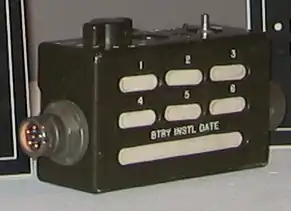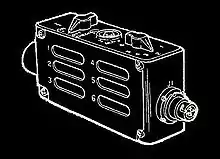KYK-13
The KYK-13 Electronic Transfer Device is a common fill device designed by the United States National Security Agency for the transfer and loading of cryptographic keys with their corresponding check word. The KYK-13 is battery powered and uses the DS-102 protocol for key transfer. Its National Stock Number is 5810-01-026-9618.

KYK-13 on display at the National Cryptologic Museum.
Even though the KYK-13 was first introduced in 1976 and was supposed to have been made obsolete by the AN/CYZ-10 Data Transfer Device, it is still widely used because of its simplicity and reliability.[1] A simpler device than the CYZ-10, the KIK-30 "Really Simple Key Loader" (RASKL) is now planned to replace the KYK-13s, with up to $200 million budgeted to procure them in quantity.[2][3]
Components

KYK-13
- P1 and J1 Connectors - Electrically the same connection. Used to connect to a fill cable, COMSEC device, KOI-18, KYX-15, another KYK-13, or AN/CYZ-10.
- Battery Compartment - Holds battery which powers KYK-13.
- Mode Switch - Three-position rotary switch used to select operation modes.
- "Z" - Used to zeroize selected keys.
- ON - Used to fill and transfer keys.
- OFF CHECK - Used to conduct parity checks.
- Parity Lamp - Blinks when parity is checked or fill is transferred.
- Initiate Push Button - Push this button when loading or zeroizing the KYK-13.
- Address Select Switch - Seven-position rotary switch.
- "Z" ALL - Zeroizes all six storage registers when Mode Switch is set to "Z."
- 1 THROUGH 6 - Six storage registers for storing keys in KYK-13.
References
This article is issued from Wikipedia. The text is licensed under Creative Commons - Attribution - Sharealike. Additional terms may apply for the media files.